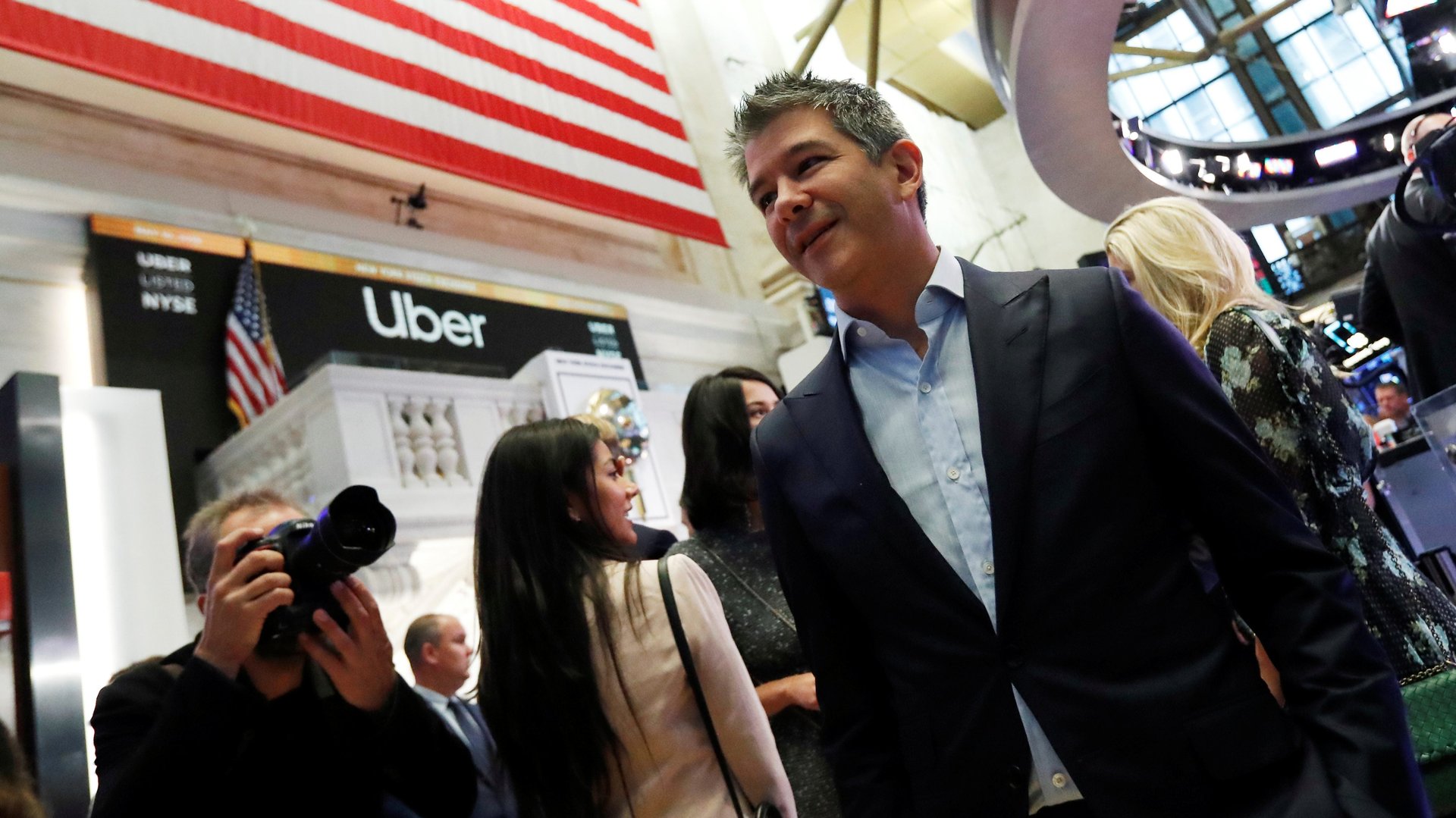The biggest winners—and losers—from Uber’s lackluster IPO
We’ve known practically since Uber started dispatching rides that one day it would make a lot of people very rich. But it’s also possible that the company could turn out to be a bad bet for some of its biggest investors.


We’ve known practically since Uber started dispatching rides that one day it would make a lot of people very rich. But it’s also possible that the company could turn out to be a bad bet for some of its biggest investors.
Uber Technologies Inc. went public on the New York Stock Exchange today, following one of the biggest IPOs ever. The debut brings a formal and symbolic end to Uber’s startup days, which lasted the better part of 10 years even as Uber grew from a brash startup to a global, multibillion-dollar company that changed transportation forever.
Uber priced its shares last night at $45 apiece, valuing the company at about $82 billion. At that price, 10 Uber shareholders would have come out of the IPO with stock holdings worth $1 billion or more, while another 15 have stakes worth at least $1 million. The billionaires include three original Uber employees—co-founders Travis Kalanick and Garrett Camp, and the company’s first CEO, Ryan Graves—while the millionaires are a mix of firms, company executives, and individual investors. (Uber board member Arianna Huffington just missed the $1 million threshold at the $45 IPO price, with a total stockholding value of $990,000.)
It’s not quite that simple, though. Bankers had reportedly sought a $120 billion valuation for Uber, and the $45 IPO price fell far short of that. It’s likely the company suffered from the disappointing March IPO of competitor Lyft, which priced its stock at $72 a share but traded down almost immediately. Shares of Lyft were trading around $51 this morning, about 30% below the IPO price.
Despite tempering expectations for its IPO, Uber opened down shortly before noon ET. The company’s stock tumbled about 5% out of the gate, to the $42 range.
How Uber fares on the public markets is crucial for its existing investors. Uber’s biggest shareholders are the Softbank Vision Fund, Benchmark Capital Partners, and Uber co-founder and former CEO Travis Kalanick. But not all of them bought stock at less than $45 per share—or less than $42—meaning a large portion of their holdings could currently be underwater.
Softbank
Japanese tech giant Softbank became Uber’s single largest shareholder in January 2018 when it took a roughly 15% stake in the company. Softbank did this deal in two parts. It bought up shares from employees and existing stockholders at $32.97 per share, a discount to Uber’s private valuation at the time. It also bought stock at Uber’s current valuation, or $48.77 per share.
That implies a solid chunk of Softbank’s Uber stake is currently worth less than Softbank paid for it. On the other hand, the discounted shares it purchased from employees and other investors are still looking like a good deal.
Softbank put another $333 million behind Uber’s driverless car research efforts in April that valued that unit independently at $7.25 billion. Softbank and its enigmatic chairman and CEO Masayoshi Son believe “all industry will be redefined like Uber,” as Son said on a quarterly earnings call in November 2016.
Benchmark
Next up on the billionaires list is Benchmark Capital Partners, the quintessential Uber frenemy. The firm helped push Kalanick out of Uber in June 2017 and sued him in two months later for fraud, breach of fiduciary duty, and “gross mismanagement.” It dropped that lawsuit in January 2018.
Benchmark invested in Uber’s Series A financing back in February 2011, when the company was valued at a now comically small $60 million, so it’s bound to make out well in the IPO. According to data from venture-capital research firm PitchBook, the stock was valued at just $3.70 per share in that Series A round—roughly 8% of the $45 IPO price—and Benchmark paid a lot less than even that. The share price rose to around $14 in later rounds Benchmark participated in, according to PitchBook.
Benchmark holds about 150 million shares of Uber stock, worth $6.8 billion at the IPO price.
Travis Kalanick
Uber’s controversial co-founder is its third-largest shareholder, with 117.5 million shares. At the IPO price, that holding was worth $5.3 billion. As the company’s co-founder, Kalanick presumably got his shares at a good price and stands to get quite the windfall from the public offering, despite the underperformance of the stock.
Other major shareholders
How the rest of Uber’s biggest shareholders fare will come down to what they paid relative to what the public markets think Uber is worth. Investors with a lot of money on the line include the Saudi Arabia Public Investment Fund, which put $3.5 billion into Uber in June 2016, then the biggest investment ever by a single investor; Alphabet; Lowercase Ventures; First Round Capital, and TPG Holdings.
Then of course there’s the question of how employees who took the bulk of their compensation in stock grants will do if Uber underperforms. The early ones at least should still make out quite well. A former Uber employee told Quartz that in Uber’s early years, the strike price on employee shares could be as little as two cents.
“It’s safe to assume the first few hundreds paid very little to exercise their stock,” said Lane Kasselman, a former communications executive at Uber. “It’s hard to imagine a scenario where they don’t see a great return.”
Want a better understanding of the 2019 IPO landscape? Sign up for a free trial of Quartz membership and check out our premium field guide to the tech IPO boom.